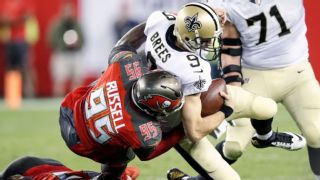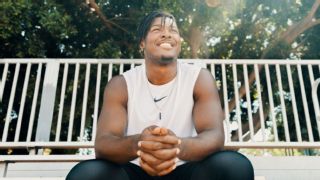|
Ryan Russell is a three-year NFL veteran. He was drafted by the Dallas Cowboys in 2015 after a successful college career at Purdue. He played one season with the Cowboys and two for the Tampa Bay Buccaneers. He started seven games for the Bucs in 2017. This is his story, in his own words. IN EARLY AUGUST, I met with an NFL team that was interested in signing me as a free agent for the upcoming season. This was a big moment for me because, other than the love for my family, playing football again in the NFL is my dream. The team invited me to meet with their front office and members of their coaching staff because, even though I missed all of the 2018 season after suffering a shoulder injury in 2017, I feel the organization believes I have the skills and character to contribute to their success. What they know about me, they like -- but there was one very important detail about my life they weren't familiar with. My performance in the interviews and workouts was first-rate. Coaches saw that I still have the kind of speed and agility to pressure quarterbacks that prompted the Dallas Cowboys to choose me in the fifth round of the 2015 draft and enjoy two successful seasons in Tampa Bay. Execs and I discussed the legacy of the organization and the culture they are trying to build to achieve success at the highest level. Though the team didn't ultimately need help at my position, I feel positive about how I presented myself that day: a hardworking, coachable, accountable and trustworthy player whose priorities are in the right place. I've never felt more confident that if I continue to train and value the right things, I can add to the winning culture of an NFL team. But for all the encouraging feelings about the visit, I do have one strong regret that has inspired me to make a promise to myself: This is the last time I will ever interview for a job as anything other than my full self. Out of love, admiration and respect, I want the next team to sign me valuing me for what I do and knowing who I truly am. Have I lied to teammates, coaches, trainers, front-office executives and fans about who I am? Not exactly. But withholding information is a form of deceit. And I want the next part of my career -- and life -- steeped in trust and honesty. During the season you spend more time with your team than with your own family; truth and honesty are the cornerstones of a winning culture. My truth is that I'm a talented football player, a damn good writer, a loving son, an overbearing brother, a caring friend, a loyal lover, and a bisexual man. Today, I have two goals: returning to the NFL, and living my life openly. I want to live my dream of playing the game I've worked my whole life to play, and being open about the person I've always been. Those two objectives shouldn't be in conflict. But judging from the fact that there isn't a single openly LGBTQ player in the NFL, NBA, Major League Baseball or the NHL, brings me pause. I want to change that -- for me, for other athletes who share these common goals, and for the generations of LGBTQ athletes who will come next.  GROWING UP, I always felt as though my existence slipped between the cracks of two worlds. I wasn't flamboyant, tidy, or any other stereotypes kids are forced to construct their world around. I wasn't straight, hyper-masculine or aggressive; I cried quite a bit, and, as a young black man, I didn't fit the bill. I played football -- so I put that in the straight column. I wrote poetry and romance stories -- so I put that in the gay column. Over time, I came to build two worlds. There was football, the drive to play at a professional level, a place that catered to my competitive instincts. Football was a world of opportunity where, if I performed well, I could earn a scholarship, support my family and build a life for myself long after I stopped playing. Then there's my personal world, which probably isn't much different from most people who are figuring out who they are in adulthood. It's a world of relationships, inner thoughts and off-the-field interests. For me, that's my mom and brother, hometown girlfriends, guys I spent time with in my early 20s, and my best friend Joe, a teammate from Purdue who died last year. It's my poetry, my bouts with depression, my love of Tarantino films and my passion for Hemingway. For me, the beauty of life can be found in a simple walk on the beach, the thrills of traveling to new places and the savoring of delectable cuisine. I attempt to capture life between the pages of my journals and sometimes the words are the truest form of soul. Pursuing a career in the NFL is such an intense challenge that I began to compromise my personal world -- and my personal happiness. Though I confided in close friends and family and gave myself permission to date both men and women discreetly, I deprived myself the basic privilege of living an open life. That meant I had to be strategic and cautious about meeting guys or getting involved with them during the regular season. It also meant that even though I was building important friendships on my team, I couldn't be authentic or honest about who I am or what was going on in my life. I wasn't always fully present in the locker room. Being an NFL-quality teammate takes more than just excelling on the field. It comes with common trust built by knowing your teammate is physically and mentally fortified. You know the man next to you as well as you know yourself and you, in turn, trust him irrevocably. If you aren't fully present and authentic in the training facility, you simply can't be a standout teammate. After my first season, a well-known blogger messaged me. He had come across an Instagram story of a man I was dating that included a quick snippet of me in the background. Even though the man and I were never in a post together, the dates, times and similar locations were enough evidence for the blogger to deduce that we were an item. The blogger could have revealed I was in a gay relationship. My professional world and personal world were colliding with me caught in the cataclysm. I panicked, then wrote back, reminding him that there were implications about his actions he didn't fully understand. If the blogger outed me, I was sure that would kill my career, one that was supporting not just me, but my mother and grandfather. He'd eradicate a childhood dream that was the product of years of work and sacrifice. After hearing me out, know what that blogger told me? That he would grant me this favor, but that I should be more careful. Let that sink into your brain: Even though openly LGBTQ people are thriving in every area of public life -- politics, entertainment, the top corporations in America -- they are so invisible in pro sports that a gossip blogger is doing a favor for a bisexual football player by not disclosing that he happens to date men. Nobody should need a favor to live honestly. In nobody's worlds should being careful mean not being yourself. The career you choose shouldn't dictate the parts of yourself that you embrace.  UNTIL RECENTLY, I didn't love myself enough to live openly and honestly. I was ashamed of who I am. I prayed countless nights for God to take away this part of me. I was ashamed to love women because I knew I could also love men. I stayed up so many nights in fear of being found out, in fear that the professional sports world would reject me for the way I was born. I lied to myself every chance I could. I looked in the mirror and lied, got into relationships and lied, woke up every morning and went to sleep every night lying about the fullness of my soul. During my first few seasons in the NFL, I rationalized my fear because it was easy to convince myself that hiding who I was made the most sense. The competition is so stiff to stay in the league, that any small mark can lead a front office to choose another guy for your job. Whether you're gay or straight or bisexual, you're always making sacrifices for the sake of your career, whether it's not going out during the season, or working out during your downtime. For me, not publicly acknowledging my sexuality became one of those sacrifices, just one of those hundreds of little interests or passions a pro athlete puts off until their playing days are long gone. But after my departure from the Dallas Cowboys, confiding in a few loved ones about who I am, and getting a new chance to play for the Tampa Bay Buccaneers, I started feeling the freedom of transparency -- even if it was small at first -- and the fear of people finding out and rejecting me slowly dissipated. Being more comfortable in my own skin made me a better teammate. I was able to play and start at the highest level in the world, and felt like I belonged. With football, no matter the topic, there is criticism and scrutiny. I took on the mantra, "If you don't know me personally, I don't take what you have to say personally." I began to apply the same idea to outside opinions of my sexuality. My third season in the NFL was my most successful (I played in 14 games for Tampa Bay, started seven, and had two sacks) even after battling a debilitating shoulder injury in Week 5. Nursing an injury during a contract year is an impossible situation. If you listen to your body and don't play, that doesn't reflect well on your resilience. Play through the injury, as I did for a good chunk of the season, and you risk making it worse. Playing with one arm, I finished the season with several starts and earned the respect of my team. Unfortunately, my impending surgery and unknown offseason recovery time didn't give the organization enough confidence to sign me to a future deal at the end of the season. Now, after the injury, losing my best friend, Joseph Gilliam, to cancer, and battling severe depression, truth became a part of my survival. I didn't make a Week 1 roster last season, but life was too short to do anything other than what I loved. I moved to Los Angeles and began writing stories I wished I'd heard more of as a child. I continued to heal and train for football because I knew my best days as an athlete were ahead of me. I also began to date openly and freely. In many ways, the past year of my life has been the most fulfilling, even if I wasn't able to play a snap in the NFL. I guess I always knew that healthy romantic relationships, supportive communities and meaningful hobbies make life more purposeful and less stressful. But until I started existing day-to-day in that kind of life, I didn't realize how true it was. That brings me to today, and the biggest challenge yet: Can I bring these two worlds together? Can I take all the progress in my personal life over the 12 months and combine it with the professional success that I experienced the previous year? Can I unify my separate professional and personal lives into a single one? I don't believe this is a big ask in 2019. I can tell you from experience that as long as a teammate contributes to success on the field and in the locker room, NFL players aren't concerned about who their defensive linemen date. I've never been suspended or a distraction for my conduct off the field. The NFL is a multibillion-dollar entertainment entity with the power to create working conditions that allow LGBTQ people to perform their jobs like everyone else. NFL teams who worry about the "distractions" that would come with additional media coverage have skilled PR professionals who understand that there are bigger issues on Sunday afternoon than a quarterback being asked, "What's it like having a bisexual teammate?" There are a lot of problems in the world, and a lot of issues facing the NFL. And I can say with confidence that LGBTQ players having the comfort to be themselves, date who they want, share parts of their life with friends and teammates will not rank among those issues. I witnessed college players come out, one of whom was drafted afterward, along with NFL vets who have come out after their playing days are done. I watched all this happen with a combination of hope and anxiety, feeling as though my existence once again lay between two worlds. Nevertheless, I know now truth is survival, and that we cannot survive in this world without vulnerability and love. Also, the best version of myself, the best partner, the best friend, the best teammate, is one that's open and honest. Next, it will be a signed player, then a Pro Bowler, then a Super Bowl champion who embraces who he is publicly. I feel as though this could be a step toward that future. For myself, I'm not looking to be a symbol or media star. I just want to play ball for a team that knows me off the field and values me on it. I want to encourage teammates to be the same people they have always been. I want us to remain as close as family. I want to be able to dedicate my life to football without feeling like I can't dedicate my life to truth as well. Whatever I was to you before this letter, I'm still that now. We just know each other a little better.
|


